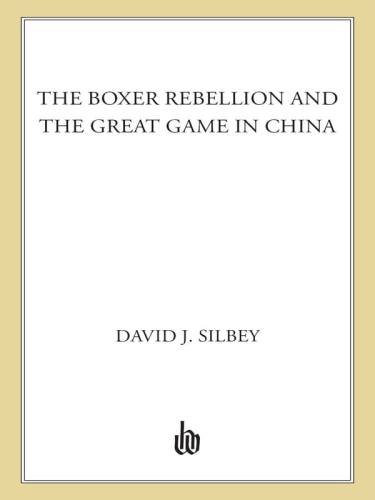
The Boxer Rebellion and the Great Game in China
- اطلاعات
- نقد و بررسی
- دیدگاه کاربران
نقد و بررسی

November 21, 2011
Silbey’s concise, lively account of an early experiment in multilateral intervention analyzes the imperialist motivations that led a mixed army of eight Western nations into a brief but bloody military expedition to suppress the Boxer movement, which spread across the plains of northern China in 1900, lashing out at the foreign powers that had carved the country into spheres of influence as the Qing dynasty wheezed toward its decline. After the Empress Dowager Cixi ended her policy of suppressing the Boxers, they besieged the foreign legation quarter of the capital in June. That in turn triggered a punitive expedition to free the legations, and fierce battles that nearly resulted in Allied Western defeat, which Silbey (A War of Frontier and Empire) describes with excellent sourcing and vivid eyewitness accounts. The “Society of Righteous and Harmonious Fists,” as the Boxers were known, arose from a complex response to drought, faltering government, and the incursions of imperial powers that often worked under the aegis of spreading Christianity. Silbey explores the machinations and conflicting motivations of the Russian, Japanese, German, American, British, Italian, Austro-Hungarian, and French troops as byproducts of the “Great Game,” a competition for colonial influence. In addition to a finely detailed account of the fighting, Silbey offers a compassionate analysis of Cixi’s limited options.

January 1, 2012
A succinct revisiting of the turn-of-the-century uprising that pitted Chinese recalcitrance against "imperial buccaneering." There are still some important lessons to be learned in studying the Boxer Rebellion, as Silbey (History/Cornell Univ.; A War of Empire and Frontier: The Philippine-American War, 1899–1902, 2007, etc.) clearly points out--certainly as a way of understanding how the Chinese have traditionally met with chaos from outside. By 1900 the incursions of the imperialistic powers Britain, Russia and Germany had forced open China to foreign trade, especially opium, weakening further the Qing dynasty and hastening an internal collapse of a poor, overpopulated country. The catastrophic loss to Japan after the First Sino-Japanese War had shocked the Chinese into a need for reform; however, it was not forthcoming under the rule of Empress Dowager Cixi. Groups of illiterate peasants, unemployed and displaced by the coming of the railroads and resentful of the presence of meddling missionaries, acted out, attacking foreigners. From the secret societies, "the last refuge of the dispossessed," emerged the Yi-he-quan, the Boxers, a kind of cult that caught on. They were steeped in martial arts and the role of being Robin Hoods, writes Silbey, and they disrupted society, catching the attention of the foreign press by the fall of 1899, and culminating in the murder of missionary Rev. Sidney Brooks. Drought and famine exacerbated local worries, spreading the movement across northern China, until finally the violence against Chinese Christians, railway workers and merchants exploded in 1900 and a combination of foreign legations fought their way to Beijing, battling for forts and arsenal, ultimately relieving the besieged embassies and breaking the Boxer resistance. Although the uprising ultimately failed, it would forge a generation of peasant resisters, whom Mao Zedong believed "did the hard and dirty work of preparing China for a true, Marxist revolution." A fresh, accessible take on a crucial turning point for the modern Chinese state.
(COPYRIGHT (2012) KIRKUS REVIEWS/NIELSEN BUSINESS MEDIA, INC. ALL RIGHTS RESERVED.)

March 1, 2012
At the turn of the 20th century, with the Chinese imperial dynasty crumbling as European and American empires were carving out their own imperial territories in China, a mysterious collection of Chinese peasants, called Boxers by the West for their fighting techniques, emerged and won the backing of the empress dowager and her government against foreign intrusions in China. Was the Boxer Rebellion a critical revolutionary movement that inspired later Chinese revolutionaries, or was it merely a peasant rebellion led by a radical faction of antiforeigners? While much of the popular historical narrative depicts the short-lived rebellion via the thrashing of the peasants by combined Western powers, Silbey (assoc. dir., Cornell in Washington; A War of Frontier and Empire: The Philippine-American War, 1899-1902) counters with a different interpretation. Researched using firsthand written documents from Western participants in the suppression of the rebellion, his book reveals that the Boxer action, far from a disorganized guerrilla effort, was a passionate, well-executed crusade that at one point had successfully repelled the onslaught of the imperial powers and helped sow the seeds of revolution for its republican and communist successors. VERDICT Recommended for readers interested in military history as well as modern Chinese history.--Allan Cho, Univ. of British Columbia Lib., Vancouver
Copyright 2012 Library Journal, LLC Used with permission.

February 1, 2012
Fought in 1900, the Boxer Rebellion resides in rigid historical interpretations, as a popular, patriotic uprising in Chinese nationalist views and as a mystical reaction against modernity in various Western perspectives. Casting categories aside, Silbey recounts the precepts of the Righteous Fists of Harmonythe Boxersand the international crisis they precipitated between the Chinese government and a coalition of European empires, Japan, and America. Outlining the Boxers' origin in the tradition of secret societies and their recruiting success as propelled by social grievances against Christian missionaries and Chinese weakness vis--vis foreign powers, railroad construction, and a drought, Silbey shows the political dilemmas the Boxer phenomenon presented to the Chinese empress dowager, Cixi. Handicapping her options, Silbey narrates what ensued from her court's decision to ally with the Boxersnamely, two military expeditions by the imperial powers to relieve their besieged legations in Beijing. The first failed. The second was a closely run operation that succeeded, as Silbey spells out in detail. Like Diana Preston in The Boxer Rebellion (2000), Silbey furnishes fluent, scholastically sound reading for general interest in modern Chinese history.(Reprinted with permission of Booklist, copyright 2012, American Library Association.)




دیدگاه کاربران